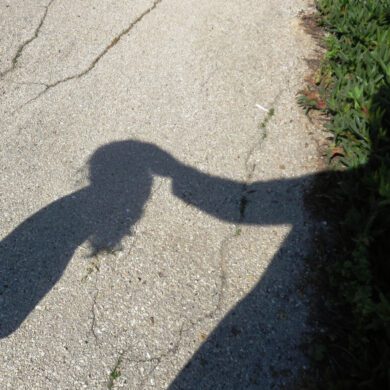When Amber Jones* twenty-year relationship crumbled two years ago, she found herself on the dating scene for the first time in decades.
A lot had changed.
“It’s a different world,” confirms the slender 42-year-old personal trainer, who lives in an affluent beachside suburb in Sydney.
Not only had dating apps like Tinder and Bumble transformed the way singles meet, but in the intervening years, the rise of hook-up culture and the growing conversation around consent had rewritten the rules of dating – and sex – itself.
Amber has embraced it all, including another generational shift: the rise of choking.
“I do enjoy it,” she says breezily. “I like the feeling of being controlled, and submissive… So yeah, it’s been very consensual, and it hasn’t been anything that I’ve not wanted to happen.”
I like the feeling of being controlled, and submissive.
Choking goes by many names – from sexual strangulation to non-fatal strangulation, or breath play – but the definition remains the same: it’s that moment when one person puts their hand (or hands) around the throat of another and chokes off their air supply, or slowly restricts blood flow to the brain.
The best-case scenario? It’s happening with your enthusiastic consent, as with Amber, and it’s a thrilling and positive part of sex, escaped from the world of porn and kinky sex play, into your bed. You don’t die.
Worst-case scenario? There’s no consent. It’s abuse, and a red flag – one that indicates that statistically speaking, there’s a good chance this person with their hands around your throat could kill you. If not tonight, eventually.
It’s this outcome that worries domestic violence campaigners, who view strangulation through its darkest lens, and believe that the rising popularity of choking puts women at risk. Others fear that strangulation has become so normalised that women, especially younger women, feel pressured to agree to it even when they feel unsafe.
What’s undeniable is that more people are experimenting with breath play in the bedroom. Australian statistics are hard to come by, but a recent US survey found that 21 per cent of women reported having been choked during sex. Another US study found that 58 per cent of university students had been choked during sex, with a quarter having been choked by age 17.
Men will often try before asking, which can be really scary.
“Just another option on the sexual buffet” was the way one woman casually described it to PRIMER.
“It’s always on the table now,” adds another 20-something Australian writer, who says that choking has become so acceptable that among her friendship group it’s become common to swap memes about it in group chats. (The tagline “Choke me Daddy” is a common theme.)
She has been choked: and while her friends say they enjoy it, it doesn’t thrill her. “I think the issue is it’s become normal so men will often try before asking, which can be really scary. I think sometimes they think if they wrap their hands around your throat it turns missionary sex into something much kinkier. Some women do like it, but I also wonder if that’s cultural pressure. You don’t want to seem boring or conservative.”
“Honestly most girls I’ve met are into choking,” writes one man on a Reddit thread. “Or let’s rephrase that ‘choking,’ which means a hand around the throat, not always even squeezing. Just the feeling of a hand around the throat.”
Honestly, most girls I’ve met are into choking.
Amber, who’s hooking up again in her forties, says her preferred dating app, Feeld (advertised as “the dating app for open-minded individuals”) makes it straightforward for her to meet partners who are likeminded when it comes to sexual tastes.
“Ahead of time, you know if you’re matched to a choking partner,” she explains. “I’ve had a few conversations, where I can say what I like, and find out what they like – and that’s awesome.You know the parameters.”
As a result, most of the people she meets on Feeld are “quite into” strangulation. “And they know the right ways to do it,” she adds. While there are different ways to strangle or choke, Amber’s experiences centre around so-called ‘blood choking’ – applying pressure to the veins and arteries in the side of the neck, to cut off blood supply to the brain.
Although Amber admits there’s always “a little bit of risk when you’re meeting someone new”, her experiences have generally been positive. There have only been a couple of times “with a particular person” when she worried she may have gone too far.
“Maybe it has to do with the spot he hit, or the pressure… But it did give me a fuzzy kind of experience, which I guess was to do with the blood being cut off. The first time it happened it freaked me out, and him as well. My vision went funny, and I was a bit disassociated. I guess that’s the right term.”
My vision went funny and I was a bit dissociated.
It’s this type of experience that worries Julia De Boos an emergency medicine specialist who works in Queensland’s remote north west, and on the Gold Coast. She has a particular expertise in examining patients after they’ve been strangled, or experienced sexual assault.
“Even though some people can do it, and enjoy it, and it be part of consensual experimentation, most of them would be unaware that if you occlude [cut off] someone’s blood vessels for more than a minute you risk killing them.”
“People have no idea how little time it can take to give you a neurological injury.”
The trouble, she adds, is that when blood stops flowing to the brain, it dysfunctions.
“That’s why people struggle to give a good timeline of being strangled. They’re often a bit all over the place. And it’s because from the moment of arterial occlusion, their brain just stopped working.”
Dr De Boos is fearful of longer term health impacts from strangulation, that we may not yet fully recognise. She’s particularly concerned by the number of younger people having strokes.
“It’s estimated that up to 25 per cent of people having strokes before the age of 45 will have strokes as a result of carotid artery damage [the arteries on the side of your neck].”
“We don’t know that they were all being strangled. Some of them might have been car accidents, or whatever. But it’s a hell of a proportion of people having strokes.”
Dr De Boos says while it only takes a relatively small amount of pressure to cut off the arteries (“if somebody can pick up a bottle of milk, they’re strong enough to strangle someone”) it takes more pressure to cut off an airway.
If somebody can pick up a bottle of milk they’re strong enough to strangle someone.
The serious criminal nature of non-fatal strangulation has prompted a string of new laws across Australia. It is now a stand-alone offence in all states, that carries its own sentence, separate to sexual assault.
In November in NSW, reforms placed strangulation into a more serious category of crime, alongside acts like murder, and manslaughter. The changes recognised that a person who has been strangled by an intimate partner is six or seven times more likely to be murdered by them, than abuse victims who aren’t strangled.
In Victoria there are now two forms of the offence. One that carries a maximum five-year prison term, that doesn’t require proof of injury and includes a consent defence. And a second more serious charge, where a perpetrator who intentionally causes injury can go to prison for up to ten years, and consent is no defence.
Sexual violence prevention campaigner and film director Maree Crabbe has just completed a survey of young people, and says in 15 years’ research, she’s never heard as many references to strangulation before.
Crabbe has directed and produced a range of films about the impact of porn, including for secondary schools.
When asked about the rationale behind choking, young women told her there was pleasure for the people doing the choking, that it gave them a sense of dominance or control. And that there’s pleasure for the women in male validation – not being seen as rigid or vanilla, but more adventurous.
Crabbe says that, too often, strangulation occurs without consent. “Respondents talked about strangulation as being something that happens to women, often with no communication, no consent, or safety.”
“Because it’s made it into the mainstream sexual repertoire, and there’s an expectation it’s part of what you do, people don’t often recognise it as sexual assault. Or sexual assault is so poorly prosecuted – or the legal system is so poor at addressing sexual assault, very many people are having those experiences, but choose not to act on it in a legal way.”
People often don’t recognise [strangulation] as social assault.
She came away from those conversations thinking there’s a need for more conversations around strangulation.
Dr De Boos shares Maree Crabbe’s concerns about the way she thinks porn is shaping the sexual experiences of young Australians.
“Because people are having their first sexual experiences through porn, rather than with each other, they learn a form of sexuality totally based on their own experience.
“So, if you have a 16-year-old boy who’s been masturbating in front of porn for a couple of years, they’ve learned to be completely preoccupied with their own pleasure. Then you introduce a girl to that equation, and they might have no intention of hurting her. But if you’ve learned sexuality in a way that is so completely dependent on you. Could you accidentally hurt them? Absolutely you could.”
Dr de Boos adds, “a lot of my job is helping young people who will give oral sex, or accept anal sex, because they don’t think of it as sex. Who don’t understand that they’ve been assaulted if they’ve been strangled. We need to talk to young people more about consent, it’s a huge problem for teenagers, who I see all the time.”
Australian consent campaigner Chanel Contos who’s observed the normalisation of choking among her 20-something peers, believes many agree to it because they feel they have little choice.
“I think it’s fake consent, because the girls do consent to it because they think that’s what they think sex is. That’s what they think intimacy is.”
Watching the surge in non-consensual strangulation with alarm is a community that knows a thing or two about choking.
Amy Elizabeth is a switch in the bondage and discipline, dominance and submission (BDSM) community in Australia, which means she can play either a dominant or a submissive role. In other words, she is strangled, and strangles, for pleasure.
“For me, a lot of it is when your partner is enjoying something that you are doing to them, there is not only a power, but also a satisfaction. And that really should be what any sexual connection should be about. It’s about sharing that.”
Safe words and gestures are integral to ethical kinky play, she asserts. Kink is about consensual power exchange. If there’s no enthusiastic consent, that’s not BDSM, that’s assault.
In other words, consent is everything.
“There’s no two ways about it. It really is that black and white. If you’re going to engage in risky sexual play, which is exactly what this is, you need to have a conversation with the person you’re doing it with.”
Amber has daughters – and admits sometimes she worries what their first sexual experiences will be like. “I’m lucky that I’m older, I’ve got more confidence, and I can tell somebody if I don’t like something. But if you’re younger it’s not as easy,” she concedes. “It’s hard to say what you want, and don’t want with a guy, in the moment. So, in that sense, it’s worrying, even scary.”
Need to speak to someone about sexual violence? Call 1800 RESPECT
Want more stories like this? Sign up to PRIMER’s free weekly newsletter here.













No Comments